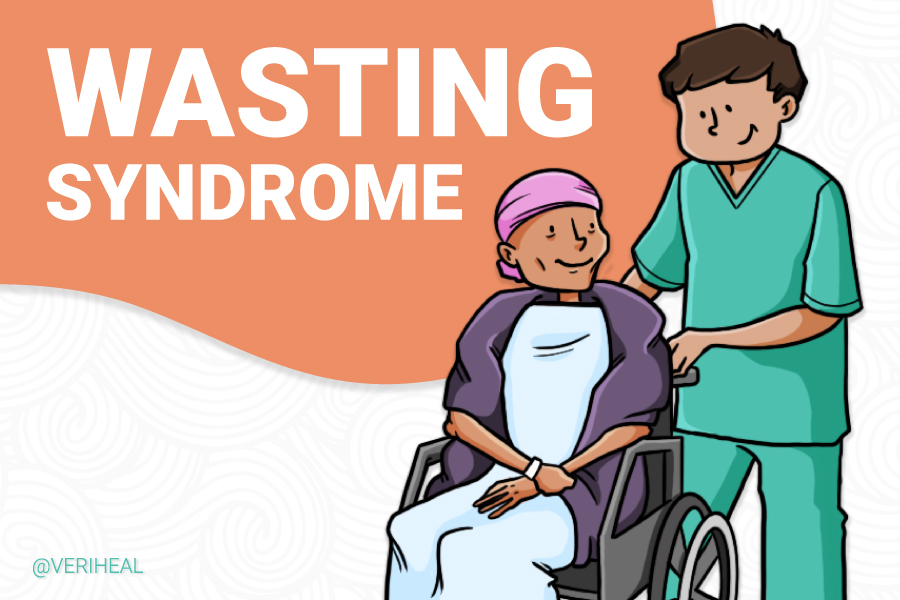Wasting Syndrome is a common condition on many lists that set out the qualifying conditions for medical cannabis. Many may not know this, but Wasting Syndrome is an AIDS-defining condition which entails undesired weight loss combined with a runny tummy or weakness and fever. This weight loss includes loss of fat and muscles, which in Acquired Immunodeficiency Syndrome (AIDS) patients can cause more problems.
Wasting syndrome can also become present as a result of cancer, tuberculosis, superior mesenteric artery syndrome, and a few others. However, Wasting Syndrome is the most common and prevalent in HIV/AIDS patients.
Wasting Syndrome can cause AIDS patients to lose 10% or more of their body weight in combination with dealing with diarrhea, weakness, and/or fever which can last at least 30 days. Once AIDS patients have lost weight, it becomes challenging for them to regain it. The muscles and fat tissues ‘waste’ away
This condition can be caused by advanced AIDS, inflammation, or opportunistic infections but is ultimately due to the chronic illness of HIV/AIDS. Patients struggling with this syndrome get full quickly and easily or they may have no appetite at all. The loss in weight, diarrhea, and lack of appetite also means that the body is not getting all the nutrients from food. AIDS patients need their bodies to hold on to and make use of as many nutrients as possible in order to prevent worsening the condition.
Why You Should Get Your Medical Marijuana Card
Veriheal has satisfied millions of patients nationwide by giving them access to these benefits
- Larger purchase limits
- Peace of mind
- Enhanced legal protection
- Access to higher potency strains
- Save up to 25% on cannabis purchases
- Skip the line at the dispensary
The most important treatment for Wasting Syndrome is the antiretroviral medication administered for AIDS, however there are additional measures a patient can take in order to assist with the signs and symptoms of the syndrome. Along with planned and healthy meals, patients can make use of cannabis.
Current Treatment Options:
- Steroids. The testosterone and anabolic steroids are useful in building up muscle and restoring the mass. However, there are major downsides to this treatment such as the risk of being infertile.
- Human growth hormones are used to gain weight and build lean muscle mass, but it can also lead to joint pain, high blood sugar, and muscle pain. This treatment is also expensive, costing more than $40 000 per year.
- Eating habit adjustments by taking nutritional supplements that provide nutrients that are easily absorbed. Patients may even set up an eating schedule to ensure that they eat at specific times, even when they aren’t hungry.
How Can Cannabis Help With Wasting Syndrome?
- Cannabis can reduce nausea and vomiting in patients. Management of nausea and vomiting is vital in the management of Wasting Syndrome.
- Cannabis can stimulate the appetite in the patients. This is important for ensuring the patients are still getting in nutrients from food. Eating also helps reduce the extremity of weight-loss. Patients with Wasting Syndrome experience loss of appetite.
- If Wasting Syndrome causes the patient any pain or inflammation as a result of other symptoms, cannabis can be used to reduce both the pain and inflammation.
As you can see, cannabis is very useful in the management of Wasting Syndrome. Luckily, the condition is on the ‘qualifying conditions’ list for medical marijuana. Besides all the benefits, cannabis is also very safe to use and presents with less severe, if any, adverse side effects.
The effectiveness of cannabis as a treatment for managing Wasting Syndrome has been proven in several studies, including one that makes use of a product-placebo approach. This means that one group was treated with cannabis, while the other was treated with a placebo. The results displayed that those using cannabis gained weight and dealt with the syndrome better as a whole. More studies can be found published in the Journal of Acquired Immune Deficiency Syndromes.
Although the focus was on patients with HIV/AIDS suffering from Wasting Syndrome, cannabis can still help any patient with the syndrome, even if it came about as a result of a different type of chronic condition.
Author, Share & Comments
















